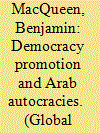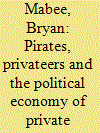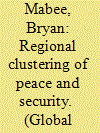|
|
|
Sort Order |
|
|
|
Items / Page
|
|
|
|
|
|
|
| Srl | Item |
| 1 |
ID:
088909


|
|
|
|
|
| Publication |
2009.
|
| Summary/Abstract |
Public diplomacy has become a critical component in grand strategy, particularly where the use of force by a state engages the attention of foreign audiences. 'Propaganda wars' now accompany, if not dominate, military moves on the battlefield, as rival states - and non-state actors - compete for the support of world public opinion. But whereas the military aspects of armed conflicts have been closely studied, their rhetorical side is only now beginning to attract the attention it deserves. This article seeks to advance the study of public diplomacy and propaganda wars by proposing a perspective that is based on the sociological and social-psychological theories of self-presentation and impression management. The assumption of a social and normative context renders meaningful the public accounts of conduct that states offer, while conceptualizing states as engaged in competitive self-presentation acknowledges the role of strategic considerations in shaping the message. The theoretical discussion develops the connection between rhetorical strategies and image-related predicaments in foreign public opinion. This is then applied to the analysis of a notable recent case - Israeli public diplomacy in the 2006 Lebanon war.
|
|
|
|
|
|
|
|
|
|
|
|
|
|
|
|
| 2 |
ID:
088907


|
|
|
|
|
| Publication |
2009.
|
| Summary/Abstract |
This article analyses the relationship between civil society and conflict. It aims to provide an analytical framework to unpack this complex relationship and assess the impacts which civil society may have on conflict. In a first section, it analyses the implications of context on civil society, namely the implications that statehood, democracy, nationalism, development and international presence have on the nature of civil society. In the second section it examines more specifically the role of civil society in ethno-political conflicts, or as we rename it 'conflict society'. The final section turns to the identification of different factors determining the impact of civil society on conflicts, including political identities, frameworks of action and political opportunity structures in which civil society actors operate. Accordingly, the different combinations of these determinants lead to the formation of civil society actors and ensuing actions that can either fuel conflict, sustain the status quo, or build peace
|
|
|
|
|
|
|
|
|
|
|
|
|
|
|
|
| 3 |
ID:
088902


|
|
|
|
|
| Publication |
2009.
|
| Summary/Abstract |
This article explores the intersection between the policy of democracy promotion and the political dynamics of change in the Arab world. Based on extensive field research, this article unpacks the resilience of Arab regimes, asking the question: has the policy of democracy promotion assisted in the maintenance of autocratic and authoritarian regimes in the Arab world? Here, it is argued that the democracy promotion policy of the George W. Bush administration has enabled autocratic and authoritarian regimes across this region to enhance their capacity for social penetration and to exploit a lack of effort to promote the idea of democracy, facilitating direct and indirect modes of repression against opposition forces that have drawn from democracy promotion funding. This has enabled these regimes to enhance the processes of elite change, co-option and imitative institution building that have been central to their resilience in the face of seemingly unavoidable challenges.
|
|
|
|
|
|
|
|
|
|
|
|
|
|
|
|
| 4 |
ID:
088910


|
|
|
|
|
| Publication |
2009.
|
| Summary/Abstract |
This research bridges two well-established bodies of literature; democratization literature and development literature. Scholars in the first camp frequently focus on the relationship between democracy and economic performance, whereas researchers adhering to the second camp often attempt to establish the link between good governance and sustainable economic and social development. However, both groups fall short of systematically linking the effect of democracy to good governance. Focusing on Africa and Latin America this research fills this gap by examining whether democracy and democratization lead to more responsible and effective governance. Through pooled time-series analysis this article reveals a strong significant effect of democracy on good governance. This article also illustrates that a state's move toward democracy immediately triggers improved governance practices, albeit with a stronger effect on Africa than on Latin America.
|
|
|
|
|
|
|
|
|
|
|
|
|
|
|
|
| 5 |
ID:
088900


|
|
|
|
|
| Publication |
2009.
|
| Summary/Abstract |
Historical accounts of private violence in international relations are often rather under-theorised and under-contextualised. Overall, private violence historically needs to be seen in the context of the relationship between state-building, political economy and violence, rather than through the narrative of states gradually monopolising violence. Pirates and privateers in late-seventeenth and early-eighteenth century Europe were embedded in a broader political economy of violence which needed and actively promoted 'private' violence in a broader pursuit of power. As such, the de-legitimatisation of piracy and privateering were the consequence of a number of interlinked political economic trends, such as the development of public protection of merchant shipping (through the growth of centralised navies), the move away from trade monopolies to inter-imperial trade, and the development of capitalism and industrialism. Present forms of private violence also need to be seen as part of a broader historical dynamic of war, violence and political economy.
|
|
|
|
|
|
|
|
|
|
|
|
|
|
|
|
| 6 |
ID:
088901


|
|
|
|
|
| Publication |
2009.
|
| Summary/Abstract |
The aim of this article is to comprehend how peace and security cluster at the regional level. In a globalized and interconnected world, each polity engages in a wide range of different relationships with other polities. Peace and security embody one of these relationships, since to feel secure or to be in peace entails managing a relationship with the 'other'. This article is divided in three parts. First, it briefly assesses classical theories of regional security in order to detect some of their shortcomings and to propose an alternative path. Second, it breaks down the concept of regional security in order to pinpoint two different (albeit sequential) empirical manifestations of regional security: regional violence-insecurity and regional peace-security. This dichotomy is associated to the passive and active components of peace and security. Third, the article describes the different paths that lead to the regionalization of peace and security (in its dual dimension).
|
|
|
|
|
|
|
|
|
|
|
|
|
|
|
|
| 7 |
ID:
088905


|
|
|
|
|
| Publication |
2009.
|
| Summary/Abstract |
Populist charismatic leaders have power to mobilise the people. According to Laclau, the articulation of a populist discourse, where a leader will typically claim to speak on behalf of the people, can provide a valid alternative to an increasingly discordant dominant ideological discourse. Furthermore, and this is particularly true of Latin America, populist leadership has been most successful in political terrains where first, the political culture has traditionally endorsed personalised forms of leadership and second, where political institutions have traditionally been weak. Under these circumstances, it is not surprising that the ever-present spectre of authoritarianism continues to undermine the fragile democracies of Latin America. It is also true that such forms of leadership pose serious constraints to the possibility of a shift towards more horizontal organisational forms in politics. But, as this article argues, there are problems with the assumptions that radical democrats make, particularly in regard to representation and popular sovereignty; furthermore, the fundamental premise that 'the people' are able to organise and lead themselves seems unduly optimistic. It is concluded that leadership is essential to the political process, and in particular that populist and/or charismatic leaders are effective agents of political transformation, whilst acknowledging that they can be dangerous to egalitarian socio-political causes attempting to enhance the autonomy of civil societies. These dynamics are illustrated by the ambiguity inherent in the role played by Mexico's Subcomandante Marcos; whilst he deliberately avoids populist tactics that might undermine the ideals of horizontal anti-hierarchical politics, ironically it is his personal appeal that has been crucial in promoting his political message.
|
|
|
|
|
|
|
|
|
|
|
|
|
|
|
|
|
|
|
|
|